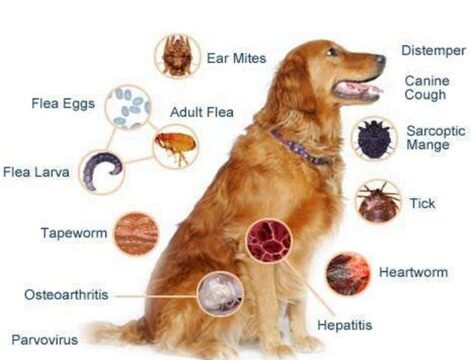Recognizing signs of a healthy dog
A healthy dog is a happy dog! As dog owners, it is crucial for us to be able to recognize the signs of a healthy dog. By understanding what to look out for, we can ensure that our furry friends are in optimal physical condition and provide them with the care they need. So, what are the signs that indicate a dog is healthy? Let’s dive into it.
Appearance: One of the first things we notice about a dog is their appearance. A healthy dog will have a shiny coat that is free from flakes or bald patches. Their skin should be clean and free from redness or irritations. Additionally, their eyes should be clear and bright, without any discharge or redness. Pay attention to their ears as well – they should be clean and odorless. Finally, their nose should be moist, not excessively wet or dry.
Energetic and Active: Dogs are naturally energetic creatures, and a healthy dog should have plenty of pep in their step. They should be enthusiastic about playing, going for walks, and engaging in physical activities. If your dog is lethargic and lacks interest in their usual activities, it may be a sign of an underlying health issue. However, it’s important to note that different dog breeds have varying energy levels, so it’s essential to familiarize yourself with your specific breed’s typical behavior.
Normal Eating and Drinking Habits: A healthy dog will typically have a good appetite and maintain a stable weight. They should show excitement and enthusiasm when it’s time for meals. Similarly, they should drink an appropriate amount of water, without excessive thirst or disinterest in drinking. Consistency in their eating and drinking habits is a positive indicator of overall health. However, drastic changes in their appetite or water intake may signal an underlying health problem and require a visit to the veterinarian.
Identifying common health problems in dogs
Dogs are beloved members of our families, and just like humans, they can experience health problems. It’s important for dog owners to be aware of common health issues that dogs may face so that they can recognize the signs and seek appropriate treatment. In this blog post, we will discuss some of the most common health problems that dogs can experience and how to identify them.
1. Ear Infections: Ear infections are a common health problem in dogs, especially those with floppy ears. Symptoms of an ear infection may include itching, redness, swelling, discharge, and odor from the ears. If you notice any of these signs, it’s important to take your dog to the veterinarian for proper diagnosis and treatment.
2. Dental Disease: Dental health problems are also prevalent in dogs. Signs of dental disease may include bad breath, swollen or bleeding gums, tartar buildup, and difficulty eating. Regular dental care, such as brushing your dog’s teeth and providing dental chews, can help prevent dental problems. If you suspect that your dog has dental issues, consult your veterinarian for a thorough dental check-up.
3. Skin Allergies: Skin allergies are common in dogs and can be caused by various factors, including food allergies, environmental allergens, and flea bites. Symptoms of skin allergies may include itching, redness, rash, scabs, and hair loss. Your veterinarian can help identify the cause of the allergy and recommend proper treatment, which may include dietary changes, medication, or topical treatments.
4. Arthritis: Arthritis is a common health problem, especially in older dogs. Signs of arthritis may include limping, stiffness, difficulty getting up or lying down, and a reluctance to exercise. If you notice any of these signs, it’s important to consult your veterinarian for an accurate diagnosis and to explore treatment options, such as pain medication and joint supplements.
5. Urinary Tract Infections: Urinary tract infections (UTIs) can occur in dogs and can cause discomfort and pain. Symptoms of a UTI may include frequent urination, straining to urinate, blood in the urine, and accidents in the house. If you suspect that your dog has a UTI, it’s important to seek veterinary care for proper diagnosis and treatment, which may include antibiotics.
| Common Health Problems in Dogs | Symptoms | Treatment |
|---|---|---|
| Ear Infections | Itching, redness, discharge | Veterinary diagnosis and medication |
| Dental Disease | Bad breath, swollen gums, tartar buildup | Regular dental care, veterinary check-up |
| Skin Allergies | Itching, redness, hair loss | Veterinary diagnosis and treatment |
| Arthritis | Limping, stiffness, difficulty moving | Consultation with a veterinarian for treatment options |
| Urinary Tract Infections | Frequent urination, blood in urine | Veterinary diagnosis and antibiotic treatment |
Being aware of these common health problems in dogs and their associated symptoms can help dog owners identify potential issues early on and seek proper care for their furry companions. Remember, if you notice any signs of illness or discomfort in your dog, it’s always best to consult with a veterinarian for an accurate diagnosis and appropriate treatment.
Preventing obesity and maintaining a healthy weight
Preventing obesity and maintaining a healthy weight in dogs are crucial for their overall well-being and longevity. Obesity in dogs can lead to a variety of health issues, including arthritis, diabetes, heart disease, and decreased lifespan. Therefore, it is important for dog owners to prioritize their pets’ weight management to ensure they live a happy and healthy life.
One of the key aspects of preventing obesity in dogs is maintaining a balanced and nutritious diet. Providing high-quality dog food that is suitable for your pet’s age, size, and breed is essential. Avoid overfeeding and resist the temptation to give your furry friend excessive treats or table scraps. Instead, opt for healthy and low-calorie treats, such as carrot sticks or small pieces of apple, to reward good behavior.
Regular exercise is another crucial component of maintaining a healthy weight in dogs. Engage in daily physical activities with your furry companion, such as brisk walks, playing fetch, or engaging in interactive games. Not only does exercise help burn calories, but it also provides mental stimulation and strengthens the bond between you and your pet.
- Monitor your dog’s weight regularly to keep track of any changes. If you notice a significant increase or decrease in weight, consult your veterinarian.
- Limit the amount of people food you give to your dog. Many human foods are high in fat and can lead to weight gain in dogs.
- Consider portion control and use measuring cups or a kitchen scale to accurately measure your dog’s food. This helps prevent overfeeding.
| Benefits of Preventing Obesity and Maintaining a Healthy Weight in Dogs: |
|---|
| 1. Avoidance of health issues like arthritis, diabetes, and heart disease. |
| 2. Increased lifespan and overall well-being. |
| 3. Improved mobility and joint health. |
| 4. Prevention of excessive strain on organs and body systems. |
| 5. Enhanced energy levels and vitality. |
Remember, prevention is key when it comes to obesity in dogs. By implementing these tips and following a healthy lifestyle for your furry friend, you can keep them fit, active, and full of vitality for years to come!
Maintaining dental health in dogs
When it comes to caring for our furry friends, it’s important not to overlook their dental health. Just like humans, dogs can suffer from dental issues such as gum disease, tooth decay, and bad breath. Maintaining dental health in dogs is essential for their overall well-being and can prevent the development of more serious health problems. In this blog post, we will explore some key tips for keeping your dog’s teeth clean and their smile bright.
Regular brushing is one of the most effective ways to maintain your dog’s dental health. Just like us, dogs need their teeth brushed to remove plaque and prevent tartar buildup. Using a dog-friendly toothbrush and toothpaste, gently brush your dog’s teeth in a circular motion. Aim to brush their teeth at least two to three times a week to keep their teeth and gums healthy.
In addition to regular brushing, providing your dog with teeth-cleaning treats and toys can also help promote dental health. Dental chews and chew toys specifically designed to reduce plaque and tartar buildup can be a great addition to your dog’s oral care routine. These treats and toys not only help keep their teeth clean but also provide them with a fun and enjoyable activity.
Furthermore, it’s important to schedule regular dental check-ups with your veterinarian. Your vet can examine your dog’s teeth, identify any potential dental issues, and perform professional cleanings if necessary. Regular dental check-ups are crucial in detecting and treating dental problems early on, which can save your dog from unnecessary pain and expensive treatments.
Summary:
To maintain your dog’s dental health, remember these key tips: regular brushing using dog-friendly toothbrush and toothpaste, providing teeth-cleaning treats and toys, and scheduling regular dental check-ups with your vet. By incorporating these practices into your dog’s routine, you can help prevent dental issues and ensure their dental health is in top shape.
Content Rich:
Did you know that dental health in dogs is just as important as their overall health? Neglecting oral care can lead to gum disease, tooth decay, and even affect their overall well-being. To ensure the well-being of your furry friend, it’s crucial to maintain their dental health. Follow these simple yet effective tips to keep your dog’s teeth clean and their smile bright: regular brushing, teeth-cleaning treats and toys, and regular dental check-ups. Don’t forget, a healthy mouth equals a happy dog!
List:
- Regular brushing using dog-friendly toothbrush and toothpaste
- Providing teeth-cleaning treats and toys
- Scheduling regular dental check-ups with your vet
Table:
| Tip | Description |
|---|---|
| Regular brushing | Gently brush your dog’s teeth using a dog-friendly toothbrush and toothpaste |
| Teeth-cleaning treats and toys | Provide your dog with dental chews and chew toys designed to reduce plaque and tartar buildup |
| Regular dental check-ups | Schedule routine visits to the veterinarian for dental examinations and professional cleanings if necessary |
Preventing and treating skin conditions
When it comes to our furry friends, dogs are no exception to the fact that skincare is just as important for them as it is for us. Skin conditions in dogs can range from mild irritations to more serious issues that require medical attention. As responsible pet owners, it is crucial for us to be aware of the signs of skin problems in our dogs and take necessary precautions to prevent them.
One of the most effective ways to prevent skin conditions in dogs is by maintaining a proper grooming routine. Regularly brushing your dog’s coat not only helps in removing loose hair and preventing matting but also stimulates the production of natural oils that keep the skin moisturized. Additionally, keeping your furry friend clean and free from dirt, parasites, and allergens can significantly reduce the risk of skin problems.
Another aspect of preventing skin conditions in dogs is ensuring their diet is well-balanced and provides all the necessary nutrients. A healthy diet not only contributes to their overall well-being but also supports their skin health. Feeding your dog high-quality food that is rich in essential fatty acids, vitamins, and minerals can help strengthen their immune system and promote healthy skin.
- Regular grooming: Brushing your dog’s coat and keeping them clean helps prevent skin issues.
- Balanced diet: Feeding your dog nutritious food supports healthy skin and strengthens their immune system.
- Know the signs: Be vigilant about any signs of skin problems such as itching, redness, flaking, or bald patches.
- Veterinary care: Regular check-ups with a veterinarian can catch skin issues early and provide appropriate treatment.
- Protect from environmental factors: Keep your dog protected from extreme weather conditions and allergens that can trigger skin reactions.
Despite our best efforts, skin conditions can still occur in dogs. In such cases, it is essential to seek veterinary advice for proper diagnosis and treatment. Remember, each dog is unique, and what works for one may not necessarily work for another. Your veterinarian will be able to provide tailored treatment options based on the specific needs of your furry companion.
| Common Skin Conditions | Symptoms | Treatment |
|---|---|---|
| Allergies | Itching, redness, rashes | Identify and avoid allergens, medication |
| Bacterial Infections | Redness, sores, hair loss | Antibiotics, medicated shampoos |
| Fungal Infections | Scaly patches, hair loss, itching | Antifungal medications, topical treatments |
| Parasites | Scratching, visible parasites | Medication, regular flea/tick prevention |
Preventing and treating skin conditions in dogs requires a proactive and holistic approach. By being observant, maintaining a proper grooming routine, providing a balanced diet, and seeking veterinary care when necessary, you can help keep your furry friend’s skin healthy and happy.
Understanding common digestive issues in dogs
Dogs, like humans, can experience digestive issues that can lead to discomfort and health problems. It is important for dog owners to understand and recognize common digestive issues in order to provide their furry friends with the necessary care and treatment. In this blog post, we will explore some of the most common digestive issues that dogs may face and how to identify them.
1. Food Allergies and Intolerances: Just like humans, dogs can have allergies or intolerances to certain types of food. Common symptoms of food allergies or intolerances in dogs include vomiting, diarrhea, excessive gas, and skin problems. If you notice these symptoms after your dog consumes a particular type of food, consult with your veterinarian to determine if your dog has a food allergy or intolerance. Your vet may recommend an elimination diet or suggest alternative food options.
2. Gastrointestinal Infections: Dogs can also suffer from gastrointestinal infections caused by bacteria, viruses, or parasites. These infections can result in diarrhea, vomiting, abdominal pain, and loss of appetite. If your dog exhibits these symptoms and they persist or worsen, it is important to seek veterinary advice. Your vet may recommend tests to identify the specific pathogen causing the infection and prescribe appropriate medications to treat it.
3. Pancreatitis: Pancreatitis is inflammation of the pancreas and can occur in dogs. It often develops as a result of consuming high-fat meals or being fed inappropriate human food. Symptoms of pancreatitis in dogs include vomiting, diarrhea, abdominal pain, and loss of appetite. If you suspect your dog may have pancreatitis, it is crucial to seek immediate veterinary care as this condition can be severe and potentially life-threatening. Treatment may involve hospitalization, fluid therapy, and changes in diet.
4. Gastric Dilatation-Volvulus (GDV): GDV, also known as bloat, is a serious and potentially life-threatening condition that affects large and deep-chested dogs. It occurs when the stomach twists, causing a blockage and trapping gas inside. Common symptoms of GDV include a distended abdomen, abdominal pain, restlessness, and unsuccessful attempts to vomit. GDV is an emergency situation, and immediate veterinary attention is crucial. Surgery is often required to untwist the stomach and relieve the gas buildup.
| Digestive Issue | Common Symptoms |
|---|---|
| Food Allergies/Intolerances | Vomiting, diarrhea, excessive gas, skin problems |
| Gastrointestinal Infections | Diarrhea, vomiting, abdominal pain, loss of appetite |
| Pancreatitis | Vomiting, diarrhea, abdominal pain, loss of appetite |
| Gastric Dilatation-Volvulus (GDV) | Distended abdomen, abdominal pain, restlessness, unsuccessful attempts to vomit |
Understanding common digestive issues in dogs is essential for every dog owner. By recognizing the signs and symptoms early on, you can seek appropriate veterinary care and help your furry companion feel better as soon as possible. Remember, always consult with your veterinarian for proper diagnosis and treatment tailored to your dog’s specific needs.
Promoting mental and emotional well-being in dogs
When it comes to the well-being of our furry friends, it’s not just about their physical health, but also their mental and emotional well-being. Just like humans, dogs can experience a range of emotions and can suffer from mental health issues. As responsible pet owners, it’s important to promote their mental and emotional well-being. In this blog post, we will explore different ways to promote the mental and emotional well-being of dogs.
Proper Socialization: Dogs are social animals and need interaction with other dogs and humans. Socialization plays a crucial role in their mental and emotional well-being. It is essential to expose them to various environments, experiences, and different types of people and animals from a young age. This helps them develop confidence, reduces fear and anxiety, and enhances their overall well-being.
Regular Exercise: Physical exercise is not just important for a dog’s physical health but also for their mental and emotional well-being. Regular exercise helps reduce stress, anxiety, and depression in dogs. It provides an outlet for their energy and stimulates their minds. Whether it’s a daily walk, playing fetch, or engaging in interactive games, physical activity should be a part of every dog’s routine.
Mental Stimulation: Dogs are intelligent creatures and need mental stimulation to keep their minds sharp and active. Boredom can lead to destructive behavior and even anxiety in dogs. Providing them with toys, puzzles, and interactive games can help keep their minds engaged. Training sessions and teaching them new tricks are also excellent ways to provide mental stimulation and strengthen the bond between a dog and their owner.
Additionally, spending quality time with your dog and giving them attention and affection is crucial for their mental and emotional well-being. Dogs thrive on love and companionship. Regular veterinary check-ups, a balanced diet, and a safe and comfortable living environment are also essential factors in promoting their overall well-being. By prioritizing their mental and emotional health, we can ensure that our dogs lead happy and fulfilling lives.
List of activities to promote mental and emotional well-being in dogs:
- Regular socialization with other dogs and humans
- Engaging in physical exercise and playtime
- Providing mental stimulation through toys and interactive games
- Training sessions and teaching new tricks
- Spending quality time and giving attention and affection
- Regular veterinary check-ups and a balanced diet
Table of common mental and emotional health problems in dogs:
| Problem | Symptoms | Treatment |
|---|---|---|
| Anxiety | Restlessness, excessive barking, destructive behavior | Behavioral training, medication, natural remedies |
| Depression | Loss of appetite, lethargy, withdrawal | Behavioral therapy, exercise, medication |
| Aggression | Growling, biting, lunging | Behavioral training, socialization, professional help |
Understanding and addressing these mental and emotional health problems in dogs is crucial for their well-being. Consulting with a veterinarian or a professional dog trainer can provide the necessary guidance and support in managing such issues.
Frequently Asked Questions
1. How can I recognize signs of a healthy dog?
A healthy dog will have a good appetite, glossy coat, bright eyes, and plenty of energy. Regular exercise and a happy demeanor are also signs of a healthy dog.
2. What are some common health problems in dogs that I should watch out for?
Some common health problems in dogs include ear infections, dental issues, allergies, obesity, and skin conditions. Regular veterinary check-ups can help catch these problems early.
3. How can I prevent obesity and maintain a healthy weight in my dog?
To prevent obesity in dogs, it’s important to feed them a balanced diet, provide regular exercise, and monitor their portion sizes. Avoid giving too many treats and ensure they are getting enough physical activity.
4. How can I maintain dental health in my dog?
Regular brushing of your dog’s teeth, providing dental treats or toys, and scheduling professional dental cleanings can help maintain your dog’s dental health. It’s important to start dental care early on to prevent dental problems.
5. How can I prevent and treat common skin conditions in dogs?
To prevent skin conditions in dogs, regular grooming, a healthy diet, and avoiding allergens or irritants can help. If your dog does develop a skin condition, consult with a veterinarian for proper treatment options.
6. What are some common digestive issues in dogs and how can I understand them?
Common digestive issues in dogs include vomiting, diarrhea, constipation, and gastrointestinal infections. If your dog experiences any of these symptoms, it’s important to monitor their behavior, seek veterinary advice, and consider any recent dietary changes that may have caused the issue.
7. How can I promote mental and emotional well-being in my dog?
Mental stimulation, regular exercise, socialization with other dogs, and providing a safe and comfortable environment can all contribute to a dog’s mental and emotional well-being. Additionally, positive reinforcement and training can help build a strong bond with your dog.





